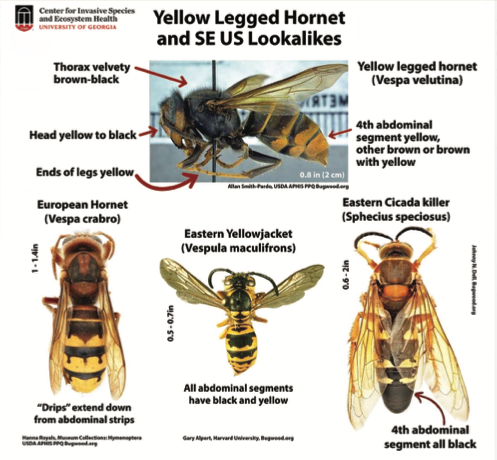GFB News Magazine
Georgians asked to watch for Yellow-Legged Hornets
Posted on August 28, 2023 8:00 PM
By Jennifer Whittaker, Georgia Farm Bureau
The non-native yellow-legged hornet, which attacks and destroys honeybees, has flown into Georgia. In early August, a Savannah beekeeper reported an unusual hornet he found on his property to the Georgia Department of Agriculture (GDA).
The GDA announced Aug. 15 that the USDA Animal and Plant Health Inspection Service (APHIS) confirmed the University of Georgia’s (UGA) identification of this insect as a yellow-legged hornet (Vespa velutina). This was the first detection of a live yellow-legged hornet (YLH) on U.S. soil. As of Aug. 25, three additional YLH sightings on different properties had been reported in the Savannah area.
.png)
Graphic courtesy of UGA Extension
GDA, USDA and UGA successfully eradicated a YLH nest in a Savannah residential area the evening of Aug. 23, Georgia Agriculture Commissioner Tyler Harper said. The nest was found in a pine tree about 85 feet off the ground.
A licensed pest control company applied cypermethrin to the nest to kill the invasive adult hornets. A licensed tree surgeon climbed the tree, almost to the nest, with a hose from the spray equipment, and applied cypermethrin directly to the nest. Additionally, an application was made to the entrance and interior as parts of the nest broke away. The tree surgeon then cut the nest out of the tree.
.png)
Graphic courtesy of Georgia Department of Agriculture
GDA is asking the public to report possible sightings of the non-native species. Visit https://gfb.ag/reportyellowleggedhornet for the latest GDA reports or to report a potential sighting.
Georgians with additional questions or concerns are encouraged to email yellow.legged.hornet@agr.georgia.gov .
YLHs can be dangerous, and everyone is encouraged to use caution in the event of a sighting. If you see a suspicious hornet, try to take a photo to send to the GDA but keep your distance.

Graphic courtesy of UGA Center for Invasive Species & Ecosystem Health
Harper warns that the YLH could potentially threaten honey production, native pollinators and Georgia crops that depend on pollination, such as blueberries, fruits and vegetables, if it is allowed to establish a population in our state.
"Georgians play an important role in helping identify unwanted, non-native pests," said Harper. "Our experienced team of professionals will continue to assess the situation and are working directly with USDA APHIS and UGA to eradicate the yellow-legged hornet in Georgia."
The YLH constructs egg-shaped paper nests above ground, often in trees. These nests can become large, housing an average of 6,000 workers.
The YLH is native to tropical and subtropical areas of Southeast Asia and is established in most of Europe, parts of the Middle East, and parts of Asia where it isn’t native.
The GDA Pest Program is collaborating with USDA and academic experts to trap, track, and eradicate the YLH in Georgia. APHIS and GDA will set out traps and survey to determine if additional YLHs are in the area. If a nest is discovered, it will be eradicated.
There are many valuable pollinator species native to the U.S. that look similar to the YLH that don’t pose a threat to honeybees. To see photos of other pollinator species that may be mistaken for yellow-legged hornets and for more info about how beekeepers can protect their hives visit https://gfb.ag/ugacaesylhinfo .
The YLH is a relative of the Northern giant hornet, sometimes referred to as the “murder hornet” for its ability to quickly kill honeybees. This invasive species was last reported in Washington State in 2021.